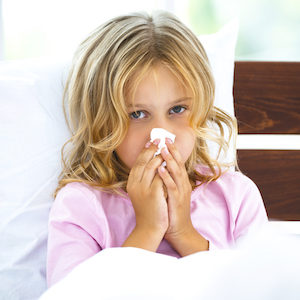Doctors’ Notes
BackIndoor Allergens
Does it seem like your child’s nose is always running? As the weather changes and we spend more time indoors, it’s time to think of indoor allergens.
 While viral colds are very common, especially in the fall and winter, another cause of a chronic runny nose is allergies. The providers at Kids Plus can determine whether your child is suffering from indoor allergic rhinitis (runny nose due to allergies) and recommend treatment.
While viral colds are very common, especially in the fall and winter, another cause of a chronic runny nose is allergies. The providers at Kids Plus can determine whether your child is suffering from indoor allergic rhinitis (runny nose due to allergies) and recommend treatment.
But the best way to decrease symptoms is avoiding the allergen in the first place! While we know indoor allergens cannot be completely avoided, there are things you can do to make your child more comfortable for those times spent inside.
Some of the most common allergy triggers, and how you can help prevent their symptoms, include:
Dust Mites & Droppings
These microscopic mites are found in the dust that collect naturally around your home. They hide in fabrics such as pillows, upholstered furniture, blankets, stuffed animals, and in the carpet.
Here are some good prevention tips:
• Hardwood floors greatly reduce dust collection compared to carpets or rugs
• If you do have carpets, clean them weekly with a vacuum with a HEPA filter, and keep your child out of the room for at least 20 minutes afterwards, since vacuuming can kick dust into the air that will exacerbate symptoms
• Use a special allergy-proof cloth mattress cover on your child’s mattress and pillows, and wash all bedding and blankets regularly in hot water
• Limit your child’s bed to one or two favorite stuffed animals to limit the exposure to dust at night. Stuffed animals can be cleaned with a vacuum cleaner, or sometimes even washed in the washing machine (be careful, though, because this can sometimes damage favorite lovies or make them less cuddly!). Another option is to put the stuffed animal in the freezer for a day or two (if your child can spare them!), which will kill the mites. Once they thaw, throw them in the dryer on low for a few minutes to fluff them up.
• Clean ceiling fan blades and air vents, and regularly replace filters in air conditioners or heating systems.
Indoor Molds
Microscopig mold spores that float in the air shed spores all year and are found lurking in damp poorly ventilated spaces, In this case, your child may experience allergy symptoms more during summer months when it’s hot and humid.
Here are some good prevention tips:
• Keep bathrooms, basements, and laundry rooms dry, and well ventilated. Clean with mold-preventing products.
• Use machine washable bath mats in the bathroom and clean them regularly
• Keep the relative humidity in your home below 50%. (You can get a hygrometer at most hardware stores to measure this.) When it’s humid, it might be helpful keep this in your child’s bedroom to monitor.
Dog or Cat Dander
It’s not fur from our furry pals that cause allergies, but dander (tiny flakes of shed skin) or saliva transferred to the fur when pets clean themselves.
Here are some good prevention tips:
• Keep family pets outside your child’s bedroom. Your child spends a good amount of their day in there, especially when sleeping. Keeping the door closed most of the day will ensure your child is not exposed.
• Have pets groomed regularly
• Teach kids to wash their hands after playing with pets
• If your child is going to a playdate at a friend’s house, ask if they have pets, so you can be prepared with allergy medicine in case symptoms occur
• Be careful to sweep floors, put away food, fix leaky pipes, and take out garbage/recyclables to prevent the possibility of cockroaches (yuck!).
When to Call the Office
When avoiding allergy triggers in the home isn’t working well enough, ask one of our providers about allergy medicine or shots to keep symptoms at bay. You can also refer to our Note on Over-the-Counter Allergy Treatments.
It’s possible to test for allergies to identify exactly to what your child is allergic. Our providers are happy to discuss whether this would be appropriate for your child.
If your child’s symptoms are worsening despite all of tips given above to avoid triggers, or if they develop ear pain, fever, or wheezing, they should be evaluated in the office for the possibility of other underlying causes.
As always, please call the office if you have any questions or concerns. We’re always happy to help!
Dr. Amy Maddalena, a Kids Plus Provider since 2006, is the Medical Director of our Breastfeeding Center of Pittsburgh.
Katie Melore spent a rotation at Kids Plus as a PA Student from Slippery Rock University.